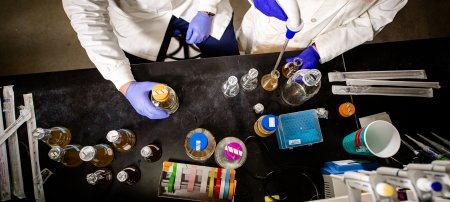Have you ever been inspired enough to commit to finding a solution to a pressing public problem?
Cedric Kennedy, Michigan Technological University business administration graduate student and president of Superior Filament, found his inspiration to commit after hearing School of Business and Economics Associate Professor Andre Laplume’s entrepreneurship class lecture on the growing problem of water bottles polluting the oceans. Only one in every six water bottles is recycled, leaving 46,000 pieces of plastic floating for every square mile of ocean.
It is facts like these that drove Kennedy to partner with fellow student Aubrey Woern, a third-year mechanical engineering major, to discover a way to recycle plastic bottles to produce the filament used in 3-D printing, also known as additive manufacturing. This filament is used to fabricate anything from simple figurines to furniture.
The process of grinding the plastic down to a pelleted form for reuse is nothing new. However, says Kennedy, “our team has improved the process in order to reduce overhead costs. Our hopes are to undercut the market once we perfect our process.”
120 Water Bottles = 1 Spool of Filament
The process takes water bottles that have been ground up, regrinds them into pellets, which then are used to form the filament. A single spool of filament uses approximately 120 discarded plastic bottles. Superior Filament then donates $1 from every filament spool purchase to the Ocean Cleanup Project. And their own incentive program recycles not only products made with their own filament. but also the products and spool cartridges of their competitors. “Changing the planet one spool at a time,” Kennedy calls it.
Their fledgling company captivated judges and spectators alike at the New Venture Competition at Central Michigan University in April. Superior Filament brought home a $10,000 Best Technology Award, as well as another $1,000 for Best Pitch and the $250 Audience Choice Award.
Kennedy and Woern founded Superior Filament as an open-source company in hopes of “inspiring high school teachers to get students involved,” Kennedy explains. As an open-source company, it encourages a collective effort toward an “ultimate goal, removing plastic from the environment.” Working with the Michigan Tech Enterprise Corporation (MTEC) SmartZone under the guidance of Joshua Pearce, associate professor of materials science and engineering and electrical and computer engineering, and Laplume at Michigan Tech. open-source enables others to see the ideas, attempts, failures and successes of the whole filament project.
Open to All
Why would a company such as Superior Filament allow open access to their discoveries? Quite simply, “allowing others access moves the project forward, with each contributing to the solution, a cleaner environment,” Kennedy explains.
The impact of plastic on the environment goes much deeper than floating debris in the ocean. The chemicals released in the century it takes some plastic to break down will eventually end up on our dinner plates. People like Kennedy and Woern have been inspired to make a change beyond the simple step of refusing to use bottled water. They are dedicating their time, efforts and ideas to finding a solution on a greater scale--with the production of 3=D filament—turning one of the greatest threats to the environment, plastic bottles, into a useful product.
The student entrepreneurs are conducting crowdfunding on Indiegogo to support their efforts.
Michigan Technological University is an R1 public research university founded in 1885 in Houghton, and is home to nearly 7,500 students from more than 60 countries around the world. Consistently ranked among the best universities in the country for return on investment, Michigan's flagship technological university offers more than 185 undergraduate and graduate degree programs in science and technology, engineering, computing, forestry, business, health professions, humanities, mathematics, social sciences, and the arts. The rural campus is situated just miles from Lake Superior in Michigan's Upper Peninsula, offering year-round opportunities for outdoor adventure.






Comments